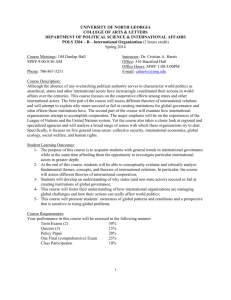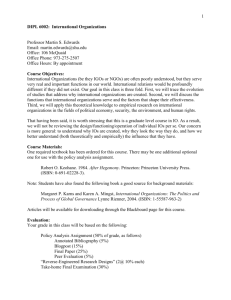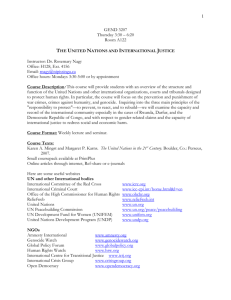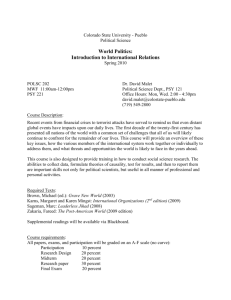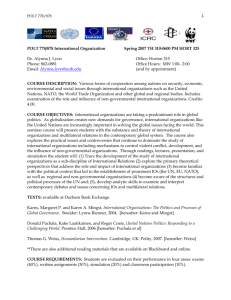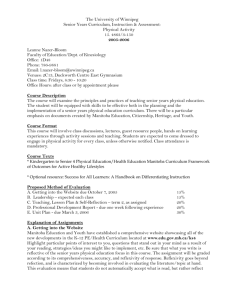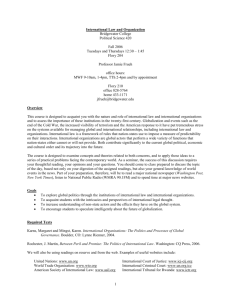2104 (online)
advertisement
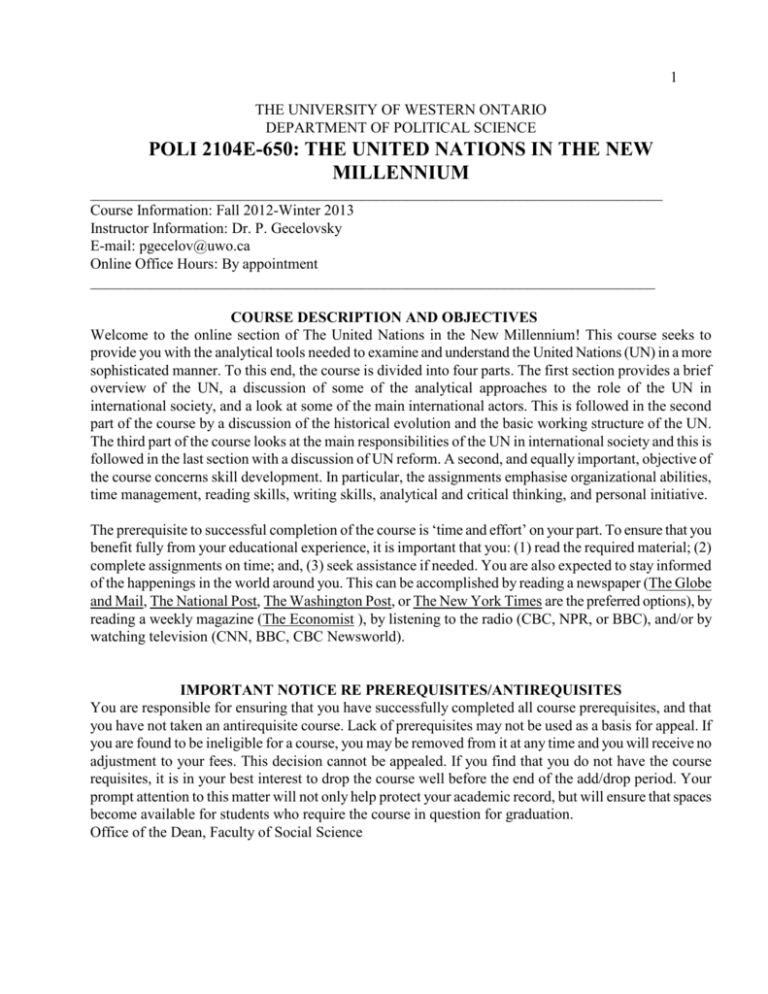
1 THE UNIVERSITY OF WESTERN ONTARIO DEPARTMENT OF POLITICAL SCIENCE POLI 2104E-650: THE UNITED NATIONS IN THE NEW MILLENNIUM ____________________________________________________________________________ Course Information: Fall 2012-Winter 2013 Instructor Information: Dr. P. Gecelovsky E-mail: pgecelov@uwo.ca Online Office Hours: By appointment ___________________________________________________________________________ COURSE DESCRIPTION AND OBJECTIVES Welcome to the online section of The United Nations in the New Millennium! This course seeks to provide you with the analytical tools needed to examine and understand the United Nations (UN) in a more sophisticated manner. To this end, the course is divided into four parts. The first section provides a brief overview of the UN, a discussion of some of the analytical approaches to the role of the UN in international society, and a look at some of the main international actors. This is followed in the second part of the course by a discussion of the historical evolution and the basic working structure of the UN. The third part of the course looks at the main responsibilities of the UN in international society and this is followed in the last section with a discussion of UN reform. A second, and equally important, objective of the course concerns skill development. In particular, the assignments emphasise organizational abilities, time management, reading skills, writing skills, analytical and critical thinking, and personal initiative. The prerequisite to successful completion of the course is ‘time and effort’ on your part. To ensure that you benefit fully from your educational experience, it is important that you: (1) read the required material; (2) complete assignments on time; and, (3) seek assistance if needed. You are also expected to stay informed of the happenings in the world around you. This can be accomplished by reading a newspaper (The Globe and Mail, The National Post, The Washington Post, or The New York Times are the preferred options), by reading a weekly magazine (The Economist ), by listening to the radio (CBC, NPR, or BBC), and/or by watching television (CNN, BBC, CBC Newsworld). IMPORTANT NOTICE RE PREREQUISITES/ANTIREQUISITES You are responsible for ensuring that you have successfully completed all course prerequisites, and that you have not taken an antirequisite course. Lack of prerequisites may not be used as a basis for appeal. If you are found to be ineligible for a course, you may be removed from it at any time and you will receive no adjustment to your fees. This decision cannot be appealed. If you find that you do not have the course requisites, it is in your best interest to drop the course well before the end of the add/drop period. Your prompt attention to this matter will not only help protect your academic record, but will ensure that spaces become available for students who require the course in question for graduation. Office of the Dean, Faculty of Social Science 2 REQUIREMENTS (1) TEXT: Karen A. Mingst and Margaret P. Karns, The United Nations in the 21st Century. 4th ed. Boulder, CO: Westview Press, 2012. Additional readings will be posted on WebCT. (2) ASSIGNMENTS: (A) Seminar Papers (B) Response Papers 60 (4 x15) 40 (2x20) Due Dates for Assignments: Fall Semester: Seminar Paper 1: Seminar Paper 2: October 9 November 6 Response Paper 1: Winter Semester: Seminar Paper 3: Seminar Paper 4: Response Paper 2: November 27 January 29 March 5 March 26 Basic Requirements for Assignments: All papers submitted must meet the following requirements concerning margins, line spacing, font size, cover page format, and format. Papers written for this course are to follow the standard page format. That is, papers are to have one inch margins on both the left and right sides and the top and bottom of the page. Papers are to be double-spaced. Acceptable font sizes are 10-12 characters per inch Times New Roman. Papers must include a cover page indicating the title of the paper, the name(s) and student number(s) of the author(s), my name (spelled correctly), the course number and the date. Papers should also include a word count on the last page of the written portion of the assignment (i.e. before end notes, if any). Finally, papers are to be in Word or PDF format. (A) Seminar Papers: The papers should be two-three pages in length (500-750 words). There are two types of seminar papers: (i) analysis: In this form of writing, you should analyse an interesting or significant point raised in the reading(s). The purpose of the papers is to analyze the content of the reading, not repeat what the author(s) has written; the papers are analytical in form, not descriptive. The paper should not be a restatement of the reading(s) but rather an analysis of a relevant issue or argument put forward by the author(s). Remember I have read the readings and am familiar with the content. When preparing the seminar papers, you should keep in mind the following questions: (a) What is the main argument? (b) What evidence is provided to support the thesis? (c) Is the evidence provided convincing? Is it connected with the thesis? (d) What, if any, underlying assumptions guide the analysis? (e) Does my paper go beyond description or reiteration of the reading? (f) What is the thesis statement in my seminar paper? Is it clear? Is it supported? 3 (ii) summary: See How to Write an Academic Summary and Writing an Academic Summary documents on OWL for assistance on writing a summary. You are required to write a minimum of four seminar papers covering the material from the course readings. This is broken down into two seminar papers per semester. You have a choice in determining the specific chapter(s) on which you will write your papers. This was done so that you may select those topics in which you have greater interest. Further, you may write more than four seminar papers and the best four will be used in calculating the final grade. (B) Response Paper: You will be required to write two response papers, one each semester. The response paper will be an argumentative essay related to the course material. You will have one week to prepare your written response. Responses will span a maximum of four pages (1,000 words) in length. Each is worth 15 per cent of the final grade. The question to be answered will be posted on WebCt at least one week prior to their due date (i.e. for the Fall Semester on November 20 and for the Winter Semester on March 19). The Response Papers are in lieu of in-class mid-term and final exams. GRADING (A) Grading of Papers: Papers will be graded and returned within two weeks of submission. Early submission of assignments is much welcomed. (B) Plagiarism and Intellectual Dishonesty: SEE APPENDIX BELOW (C) Late Penalties: Papers are due on the assigned dates and a late penalty will be assessed to any papers not submitted by the end of the day (i.e. midnight Eastern Standard Time) on the due dates. The due date for the written assignment will be followed strictly. NO EXCEPTIONS WILL BE MADE. The penalty for late submission will be a one percentage point per day reduction in the grade. Assignments will not be accepted for grading five days after the due date. A cautionary note: a computer malfunction of any sort, a work commitment, or a relationship issue are not acceptable excuses for submitting a paper late. That is, a penalty will be assessed. OFFICE HOURS If you need to talk with me directly, I will be available to discuss course matters on an appointment basis. Email me and we can set up a mutually agreeable time to talk. I expect you to keep appointments that have been made. Students have, in the past, made appointments only to not show up – this is terribly rude and inappropriate behaviour and should not be exhibited. Also, I will not respond to emails regarding information listed in the course syllabus (e.g. assignment due dates, values, etc.) The reason for this is that I have provided a course outline which you need to read and understand. 4 READINGS LIST The readings list is to some extent tentative. Changes may be made to the list to cover unexpected events, and the publication of new and updated material. The major concern governing changes to the schedule and/or readings is the extent to which the inclusion of the aforementioned items will increase your understanding of the field of study. All readings are required unless specified as recommended. All readings are drawn from the required text. **FALL SEMESTER** PART ONE: INTRODUCTION AND OVERVIEW This section provides an overview of the United Nations, along with a brief discussion of some of the main analytical approaches found in international relations and how they relate to international organizations in general and the UN in particular. The section ends with a look at the main actors in international relations. Topic 1: Introduction: A Brief Overview Mingst and Karns, Chapter 1 Topic 2: International Relations Perspectives Margaret P. Karns and Karen A. Mingst, ‘The Theoretical Foundations of Global Governance,’ in International Organizations: The Politics and Processes of Global Governance, (Boulder CO: Lynne Rienner, 2004). NOTE: This reading is not in the text. A copy will be posted on WEBCT. Topic 3: The Players: Good, Bad and Ugly Peter Willetts, ‘Transnational Actors and International Organizations in Global Politics,’ in John Baylis, Steve Smith and PatriciaOwens, eds. The Globalization of World Politics. 6th ed.(Oxford: Oxford UP, 2014). NOTE: This reading is not in the text. A copy will be posted on WEBCT. PART TWO: THE EVOLUTION AND STRUCTURE OF THE UNITED NATIONS The second section of the course outlines the evolution of the UN and the main structure of the UN system. Topic 4: The Ghosts of Past and Present Mingst and Karns, Chapter 2 pp.19-49 Topic 5: Actors in the UN System Mingst and Karns, Chapter 3 PART THREE: THE RESPONSIBILITIES OF THE UNITED NATIONS This section of the course examines the major areas of responsibility of the UN. Topic 6: Maintaining International Peace and Security Mingst and Karns, Chapter 4 pp.97-133 5 Topic 7: Humanitarian Intervention Mingst and Karns, Chapter 4 pp.133-58 International Commission on Intervention and State Sovereignty, The Responsibility to Protect, Chapters 1-6 pp.1-56 NOTE: This reading is not in the text. A copy may be found online at: http://responsibilitytoprotect.org/ICISS%20Report.pdf **WINTER SEMESTER** Topic 8 : Human Rights Mingst and Karns, Chapter 6 Topic 9: Human Security Sadako Ogata and Johan Cels, ‘Human Security: Protecting and Empowering the People,’ Global Governance, 9:3 (July-September 2003). NOTE: This reading is not in the text. A copy will be posted on WEBCT. Topic 10: International Trade Mingst and Karns, Chapter 5 Topic 11: International Development Tony Evans and Caroline Thomas, ‘Poverty, Development, and Hunger,’ in John Baylis, Steve Smith and Patricia Owens, eds. The Globalization of World Politics. 6th ed. (Oxford: Oxford UP, 2014). NOTE: This reading is not in the text. A copy will be posted on WEBCT. Topic 12: Environment Mingst and Karns, Chapter 7 PART FOUR: THE FUTURE OF THE UNITED NATIONS The last part of the course looks to the future of the United Nations and examines some of the issues on the agenda for reform within the organization. Topic 13: Canada and the UN Denis Stairs, ‘Being Rejected in the United Nations: The Causes and Implications of Canada’s Failure to Win a Seat in the UN Security Council,’ A Policy Update Paper NOTE: This reading is not in the text. A copy is available online at: http://www.cdfai.org/PDF/Being%20Rejected%20in%20the%20United%20Nations.pdf Topic 14: UN Reform Mingst and Karns, Chapter 2 pp.49-62 Topic 15: The Future of the UN Mingst and Karns, Chapter 7 6 APPENDIX TO UNDERGRADUATE COURSE OUTLINES DEPARTMENT OF POLITICAL SCIENCE Prerequisite checking ‐ the student’s responsibility "Unless you have either the requisites for this course or written special permission from your Dean to enroll in it, you may be removed from this course and it will be deleted from your record. This decision may not be appealed. You will receive no adjustment to your fees in the event that you are dropped from a course for failing to have the necessary prerequisites." Essay course requirements With the exception of 1000‐level courses, most courses in the Department of Political Science are essay courses. Total written assignments (excluding examinations) will be at least 3,000 words in Politics 1020E, at least 5,000 words in a full course numbered 2000 or above, and at least 2,500 words in a half course numbered 2000 or above. Use of Personal Response Systems (“Clickers”) "Personal Response Systems ("clickers") may be used in some classes. If clickers are to be used in a class, it is the responsibility of the student to ensure that the device is activated and functional. Students must see their instructor if they have any concerns about whether the clicker is malfunctioning. Students must use only their own clicker. If clicker records are used to compute a portion of the course grade: • the use of somebody else’s clicker in class constitutes a scholastic offence, • the possession of a clicker belonging to another student will be interpreted as an attempt to commit a scholastic offence." Security and Confidentiality of Student Work (refer to current Western Academic Calendar (http://www.westerncalendar.uwo.ca/) "Submitting or Returning Student Assignments, Tests and Exams ‐ All student assignments, tests and exams will be handled in a secure and confidential manner. Particularly in this respect, leaving student work unattended in public areas for pickup is not permitted." Duplication of work Undergraduate students who submit similar assignments on closely related topics in two different political science courses must obtain the consent of both instructors prior to the submission of the assignment. If prior approval is not obtained, each instructor reserves the right not to accept the assignment. Grade adjustments In order to ensure that comparable standards are applied in political science courses, the Department may require instructors to adjust final marks to conform to Departmental guidelines. Academic Offences "Scholastic offences are taken seriously and students are directed to read the appropriate policy, specifically, the definition of what constitutes a Scholastic Offence, at the following Web site: http://www.uwo.ca/univsec/handbook/appeals/scholoff.pdf ." 7 Submission of Course Requirements ESSAYS, ASSIGNMENTS, TAKE‐HOME EXAMS MUST BE SUBMITTED ACCORDING TO PROCEDURES SPECIFIED BY YOUR INSTRUCTOR (I.E., IN CLASS, DURING OFFICE HOURS, TA'S OFFICE HOURS) OR UNDER THE INSTRUCTOR'S OFFICE DOOR. THE MAIN OFFICE DOES NOT DATE‐STAMP OR ACCEPT ANY OF THE ABOVE. Note: Information excerpted and quoted above are Senate regulations from the Handbook of Scholarship and Academic Policy. http://www.uwo.ca/univsec/handbook/ Students registered in Social Science should refer to http://counselling.ssc.uwo.ca/ http://counselling.ssc.uwo.ca/procedures/havingproblems.asp for information on Medical Policy, Term Tests, Final Examinations, Late Assignments, Short Absences, Extended Absences, Documentation and other Academic Concerns. Non‐Social Science students should refer to their home faculty’s academic counselling office. Plagiarism "Plagiarism: Students must write their essays and assignments in their own words. Whenever students take an idea, or a passage from another author, they must acknowledge their debt both by using quotation marks where appropriate and by proper referencing such as footnotes or citations. Plagiarism is a major academic offence." (see Scholastic Offence Policy in the Western Academic Calendar). Plagiarism Checking: "All required papers may be subject to submission for textual similarity review to the commercial plagiarism detection software under license to the University for the detection of plagiarism. All papers submitted for such checking will be included as source documents in the reference database for the purpose of detecting plagiarism of papers subsequently submitted to the system. Use of the service is subject to the licensing agreement, currently between The University of Western Ontario and Turnitin.com ( http://www.turnitin.com )." Multiple‐choice tests/exams: "Computer‐marked multiple‐choice tests and/or exams may be subject to submission for similarity review by software that will check for unusual coincidences in answer patterns that may indicate cheating." Note: Information excerpted and quoted above are Senate regulations from the Handbook of Scholarship and Academic Policy. http://www.uwo.ca/univsec/handbook/ PLAGIARISM* In writing scholarly papers, you must keep firmly in mind the need to avoid plagiarism. Plagiarism is the unacknowledged borrowing of another writer's words or ideas. Different forms of writing require different types of acknowledgement. The following rules pertain to the acknowledgements necessary in academic papers. A. In using another writer's words, you must both place the words in quotation marks and acknowledge that the words are those of another writer. You are plagiarizing if you use a sequence of words, a sentence or a paragraph taken from other writers without acknowledging them to be theirs. Acknowledgement is indicated either by (1) mentioning the author and work from which the words are borrowed in the text of your paper; or by (2) placing a footnote number at the end of the quotation in your text, and including a correspondingly numbered footnote at the bottom of the page (or in a separate reference section at the end of your essay). This footnote should indicate author, title of the work, place and date of publication, and page number. 8 Method (2) given above is usually preferable for academic essays because it provides the reader with more information about your sources and leaves your text uncluttered with parenthetical and tangential references. In either case words taken from another author must be enclosed in quotation marks or set off from your text by single spacing and indentation in such a way that they cannot be mistaken for your own words. Note that you cannot avoid indicating quotation simply by changing a word or phrase in a sentence or paragraph which is not your own. B. In adopting other writers' ideas, you must acknowledge that they are theirs. You are plagiarizing if you adopt, summarize, or paraphrase other writers' trains of argument, ideas or sequences of ideas without acknowledging their authorship according to the method of acknowledgement given in 'A' above. Since the words are your own, they need not be enclosed in quotation marks. Be certain, however, that the words you use are entirely your own; where you must use words or phrases from your source, these should be enclosed in quotation marks, as in 'A' above. Clearly, it is possible for you to formulate arguments or ideas independently of another writer who has expounded the same ideas, and whom you have not read. Where you got your ideas is the important consideration here. Do not be afraid to present an argument or idea without acknowledgement to another writer, if you have arrived at it entirely independently. Acknowledge it if you have derived it from a source outside your own thinking on the subject. In short, use of acknowledgements and, when necessary, quotation marks is necessary to distinguish clearly between what is yours and what is not. Since the rules have been explained to you, if you fail to make this distinction your instructor very likely will do so for you, and they will be forced to regard your omission as intentional literary theft. Plagiarism is a serious offence which may result in a student's receiving an 'F' in a course or, in extreme cases in their suspension from the University. *Reprinted by permission of the Department of History Adopted by the council of the Faculty of Social Science, October, 1970; approved by the Dept. of History August 13, 1991 Accessibility at Western Please contact poliscie@uwo.ca if you require any information in plain text format, or if any other accommodation can make the course material and/or physical space accessible to you.
